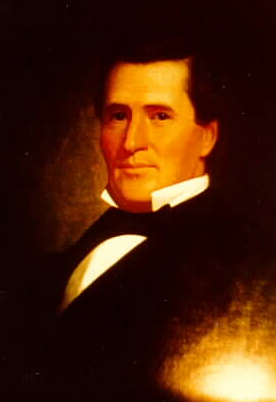Alexander William Doniphan
(1808-1887)
by Judge R. Kenneth Elliott (ret.)
 Born on July 8, 1808, near Augusta, Mason County, Kentucky, Alexander William Doniphan was the youngest of 10 children. His father died when he was about 5 years old, having been a teacher and friend of Daniel Boone. Alexander was born about 1 year before Abraham Lincoln, who was also born in Kentucky. Both Alexander and Abraham grew to be 6’4" tall. Both of Alexander’s grandparents participated in the American Revolution. Graduating from Augusta College at Bracken, KY at the age of 18, Alexander studied law in the office of Martin Marshall, a kinsman of the first Chief Justice of the U.S. Supreme Court. Alexander studied the classics, histories and then the law.
Born on July 8, 1808, near Augusta, Mason County, Kentucky, Alexander William Doniphan was the youngest of 10 children. His father died when he was about 5 years old, having been a teacher and friend of Daniel Boone. Alexander was born about 1 year before Abraham Lincoln, who was also born in Kentucky. Both Alexander and Abraham grew to be 6’4" tall. Both of Alexander’s grandparents participated in the American Revolution. Graduating from Augusta College at Bracken, KY at the age of 18, Alexander studied law in the office of Martin Marshall, a kinsman of the first Chief Justice of the U.S. Supreme Court. Alexander studied the classics, histories and then the law.
In 1829, at the age of 21 years, the new lawyer made his way up the Missouri River to Lexington where he began his law practice. In 1833, he moved to Liberty, MO and began a 30 year practice of law. Doniphan never prosecuted cases, but was always a defense lawyer. He was a mighty orator with a commanding presence and persuasive manner. He served in the State Legislature and was a staunch Whig and an admirer and supporter of Henry Clay.
During this period, Liberty was the outpost of civilization, and being near to Ft. Leavenworth, it served as the social, educational and cultural center of the area. Doniphan married a daughter of Col. John Thornton and from this marriage, two sons were born and both met untimely accidental deaths in their 16th year.
Doniphan was commander of a local militia unit and was credited for saving the life of Joseph Smith who was the leader of the Latter Day Saints Church (Mormons) at Far West, when he informed the General who had been ordered by the Missouri Governor to exterminate the Mormons, that if the General did kill these Mormons, Doniphan promised the General that he would see that the General would be prosecuted in the Courts for Murder. The General decided not to exterminate the Mormons. Doniphan represented the Mormons in Court proceedings and in other matters when they were in Missouri.
In 1846, the war between the U.S. and Mexico was in full swing and Doniphan enlisted, along with other Clay Countians. Up and down the Missouri River, volunteers from each county enlisted and at their muster at Ft. Leavenworth, Doniphan was elected as the Colonel of the Missouri Volunteer Regiment and he then lead his men on the march to Santa Fe, under the command of General Stephen Kearny. Thereafter, he was ordered to march South to Mexico with his Regiment, composed of about 900 to 1000 men. A short battle was fought North of the present site of El Paso, Texas and then the Regiment set out on the long march, about 300 miles, to capture Chihuahua. In February, 1847, just north of that city, the Battle of the Sacramento River was fought, where Doniphan’s forces overcame about 5000 Mexican Soldiers and captured the city. After marching to the Gulf of Mexico and returning through New Orleans and back home by boat, the famous Doniphan Expedition came to an end one year after it began after marching and traveling by boat about 5000 miles. It was an epochal achievement.
After returning from the War, Doniphan became the first Superintendent of Schools and gave a commencement speech at the Academy at West Point. In 1849 Doniphan and others from Clay County, MO managed to secure the establishment of a new college in Liberty, named William Jewell College, begun by the Baptists in Missouri. The college is a thriving institution to this day, attended by approximately 1600 students. At the advent of the Civil War, Doniphan went to Washington, D.C. as a member of the peace Conference in an attempt to avoid the Civil War, without success. It was on this occasion that Doniphan met Lincoln and they were asked to back up to one another to see who was the tallest, and their heights were the same.
In 1863, Doniphan moved from Liberty to St. Louis. Since he was a strong Unionist and many of his friends and clients were Southern Sympathizers, he could not resolve the conflicts within himself, he lived in St. Louis during that period. After the war was over, Doniphan moved back to Western Missouri, but not to Liberty, but to the adjoining County to the East, Ray County and there, in the Town of Richmond, he engaged in the banking business and the practice of law until his death on August 8, 1887. He finally returned to Liberty when he was buried in Liberty’s Fairview Cemetery.
On the Courthouse grounds in Richmond, in 1918, a life-sized statue of Doniphan was erected and still stands.
